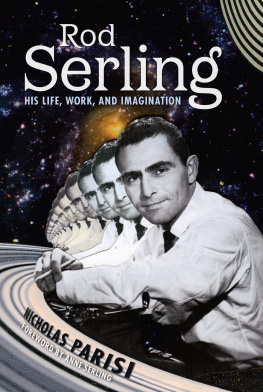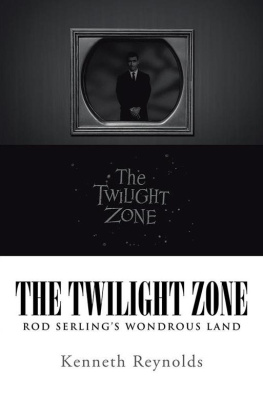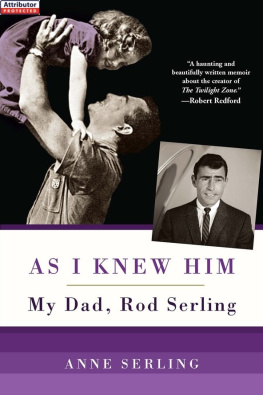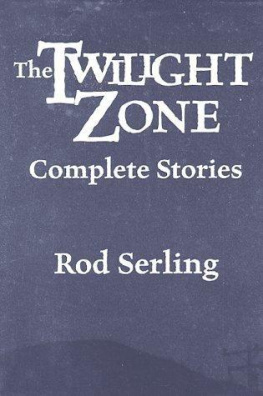
Rod Serling
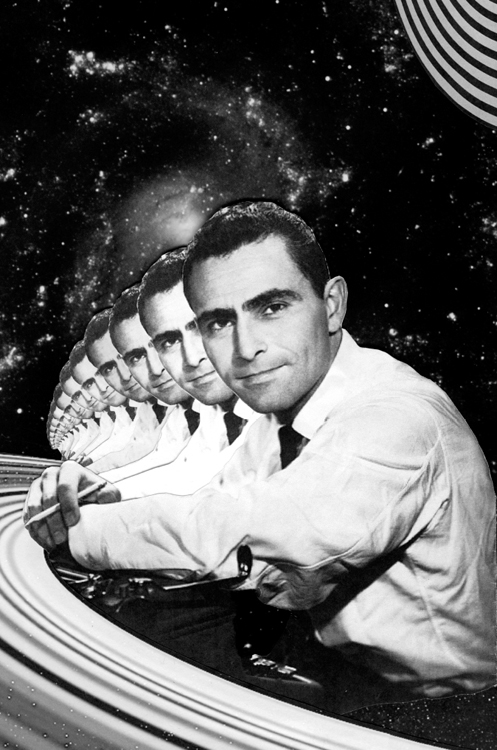
Rod
Serling
HIS LIFE, WORK, AND IMAGINATION
NICHOLAS PARISI
FOREWORD BY ANNE SERLING
UNIVERSITY PRESS OF MISSISSIPPI / JACKSON
www.upress.state.ms.us
Designed by Peter D. Halverson
Frontispiece collage by Rob Cooper
Photo credit: Bettmann / Getty Images
The University Press of Mississippi is a member of the Association of University Presses.
Copyright 2018 by Nicholas Parisi
All rights reserved
Manufactured in the United States of America
First printing 2018
Library of Congress Cataloging-in-Publication Data
Names: Parisi, Nicholas, author. | Serling, Anne, author of foreword.
Title: Rod Serling : his life, work, and imagination / Nicholas Parisi ; foreword by Anne Serling.
Description: Jackson : University Press of Mississippi, [2018] | Includes bibliographical references and index. |
Identifiers: LCCN 2018019747 (print) | LCCN 2018025789 (ebook) | ISBN 9781496819437 (epub single) | ISBN 9781496819444 (epub institutional) | ISBN 9781496819451 (pdf single) | ISBN 9781496819468 (pdf institutional) | ISBN 9781496817501 (hardcover : alk. paper)
Subjects: LCSH: Serling, Rod, 19241975Criticism and interpretation. | Twilight zone (Television program : 19591964) | Authors, American20th centuryBiography. | Television personalitiesUnited StatesBiography.
Classification: LCC PS3537.E654 (ebook) | LCC PS3537.E654 .Z77 2018 (print) | DDC 812/.54dc23
LC record available at https://lccn.loc.gov/2018019747
British Library Cataloging-in-Publication Data available
supported by a grant
Figure Foundation
here beyond infinity
Thank you, Jen and Arianna, for your love and support
and encouragement during this long journey.
I know it wasnt always easy.

This book is for Rod Serling. He left monuments.
Contents
by Anne Serling
Foreword
ANNE SERLING
My father was a storyteller. As his close friend, Dick Berg, wrote in his eulogy,
Where Rods peers may have anguished over the creative process, Rod woke up each day saying, Let me tell you a story. This was his badge, his thrust, his passkey into our lives. He was eternally the new boy on the block trying to join our games. And he penetrated the circle by regaling us with those many fragments of his Jewish imagination intellectual stories, fantastic stories, hilarious stories, stories of social content, even one-liners about mans lunacy. However they were always seen through his prism, becoming never less than his stories. And because he came to us with love seeking our love we invariably let him tell us a story. And how much richer we are for it.
For the most part, my fathers career is remembered for The Twilight Zone. But Nick Parisis book may change that. With the determination and analytic mind of an investigative reporter, Nick traces my fathers writings from beginning to end, providing the background behind each storys creation and clearly depicting the evolution of his body of work as a whole.
Nick and I first crossed paths in 2013 when he wrote me a poignant letter after the publication of my memoir, As I Knew Him: My Dad, Rod Serling. Nick wrote, in part, Your father was always on the correct side, the human side. He revealed this over and over again in his work, in speeches, in interviews. I love the man for this reasonnot for an unexpected twist at the end of a particular Twilight Zone episode, but for this. For his humanity.
It was clear from his letter that Nick was the best person to take on a project of this enormity. He obviously understood the man behind the words, and Nicks book is, without question, the most comprehensive insight into my fathers literary endeavors ever assembled. Like Amy Boyle Johnston, author of Unknown Serling, Nick was unafraid of doing the heavy lifting in researching my fathers works. He traveled to all of the collections of Serling-related materials (Wisconsin, UCLA, and Ithaca College), discovered other collections, amassed an enormous amount of research materials, documented every Serling video produced, and viewed everything he could find.
In the last interview my father did, reporter Linda Brevelle asked him what he wanted people to say about him a hundred years later. He responded, I dont care that theyre not able to quote any single line that Ive written. But just that they can say, Oh, he was a writer. Thats sufficiently an honored position for me. He also said that he felt that his writing was momentarily adequate and that it would not stand the test of time.
Enter Nick Parisi. By exploring and presenting the complete scope of my fathers work, Nick has given my father that rare gift of immortality. For those who loved my dad and for the many who appreciate his works, Nicks book has uncovered gems, a treasure trove of new stories that many (myself included) never knew about.
I will forever be grateful to Nick for this exceptional work, and I am absolutely certain that my dad would have been as well.
Rod Serling
Introduction
O n September 13, 1950, a short-lived television series, Stars over Hollywood, aired a forgettable episode, Grady Everett for the People. It starred Bert Freed as a politician whose ambitions are derailed after the media discover a skeleton in his closet. The teleplay for this half-hour melodrama was credited to Oliver Crawford, who went on to write for dozens of television series, including The Fugitive, Star Trek, and The Outer Limits. More notably, story credit went to a twenty-five-year-old World War II combat veteran named Rod Serling. It was Serlings first sale to a national television program.
Over the next twenty-five years, more than 250 of Serlings teleplays and screenplays were produced, and he won an unmatched six Emmy Awards for outstanding dramatic writing for four different series. The plays that earned him the first two of these awards, Kraft Theatres Patterns and Playhouse 90s Requiem for a Heavyweight, stand as landmarks in televisions evolution, and both were later produced as feature films. The mantle in Serlings Pacific Palisades office eventually became crowded with Writers Guild Awards, Christopher Awards, Sylvania Awards, and the first ever Peabody Award given to a television writer. While earning these accolades, Serling also earned a reputation as a fighter thanks to several well-publicized battles with skittish sponsors and timid network executives over the issue of censorship in television.
The writers role is to be a menacer of the publics conscience, Serling once said. He must have a position, a point of view. He must see the arts as a vehicle of social criticism and he must focus the issues of his time.1 When he attempted to fulfill this role by dramatizing virtually any socially relevant issue, the powers that be interfered. When they interfered, Serling fought back. The sponsors and network executives always won these battles, but Serling always went down fighting. In the process, he earned a nickname: Televisions Angry Young Man. When Rod Serling died on June 28, 1975, at the age of fifty, he was televisions most honored, most recognizable, most outspoken, and likely most prolific writer.
And in the middle of his extraordinary career, he created one of the most influential series in television history.
Asked for his thoughts on Serlings legacy, writer Richard Matheson once said, Well, its a shame if its
Next page
